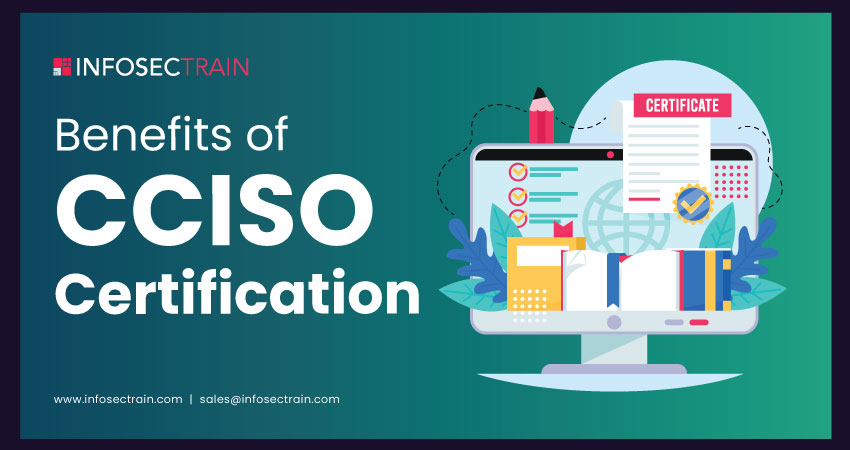Benefits of CCISO Certification

What is CCISO?
A certification program called Certified Chief Information Security Officer (CCISO) is intended for highly experienced information security professionals who want to advance their careers and take on a CISO position. A person needs technical expertise and skills like developing and maintaining an organization’s goals and strategy, to become a CISO. The CCISO is for information security managers working to become CISOs by sharpening their abilities and discovering how to match information security programs with corporate targets and goals. Additionally, this program helps current CISOs improve their managerial, technical, and operational capabilities. The Training, Body of Knowledge, and CCISO exam are the three components that make up the CCISO program’s framework. The CCISO Advisory Committee, exam writers, quality controllers, trainers, and a core group of senior information security executives all contributed to the creation of these elements.
CCISO Program Coursework Coverage
The program, which focuses on the most significant components of an information security program, was created with the optimistic CISO in mind.
The CCISO Body of Knowledge (BoK) domains—Governance and risk management, Information Security Controls, Compliance and Audit Management, Security Program Management and Operations, Information Security Core Competencies, Strategic Planning, Finance, Procurement, and Vendor Management —are tested on the CCISO exam, which measures candidates’ knowledge and abilities in these areas.
Benefits of CCISO Certification
- Developed by Professionals: The CCISO Advisory Committee, a group of working CISOs, developed the program based on their regular tasks and expertise in management and technical firms. The committee consists of security leaders from professional organizations to address the need for leadership training in information security. These leaders have generously shared their vast knowledge to develop this program.
- Establishes a Connection Between Executive Management, Financial Management, and Technical Knowledge: The CCISO program extends beyond the technical requirements to include Executive Management and Financial Management, which are critical for running a successful information security program. Instead of focusing on technical knowledge, it emphasizes how to apply it to tasks related to a Chief Information Security Officer’s day-to-day responsibilities. Professionals in information security can advance their careers by developing executive-level management, strategic planning, financial management, and organizational skills.
- ANSI EC-Council Accreditation: The American National Standards Institute (ANSI) has accredited the EC-Council for its CCISO certification program. It is one of many certification organizations that adhere to the ANSI/ISO/IEC 17024 Personnel Certification Accreditation standard, with information security being its primary area of expertise.
- The Five Domains, with a Focus on C-Level Management: By focusing on these five domains, EC-Council ensures that their beliefs coincide with those of the NICE Cybersecurity Workforce Framework (NCWF) and that they can meet the needs of businesses and organizations around the globe.
- Acknowledges the Value of Experience Gained in the Real World: An Information Security Officer needs prior knowledge to develop a comprehensive understanding of the environment to advance to a C-Level position. In light of this, the CCISO program includes numerous real-world events experienced by CISOs in the modern world. Among many other exercises, the CCISO exam tests a student’s ability to create a business transition plan for an organization in a specific industry and circumstance, utilize performance measures to communicate risk to various audiences, and describe how and where to line up security programs with corporate objectives.
CCISO Certifications Five Domains
Domain 1: Governance and Risk Management (Policy, Legal, and Compliance):
This domain covers report writing, structured planning, balancing information security needs with business requirements, leadership and management skills in compliance with cybersecurity and corporate laws and acts, and the most recent developments in information security modifications, patterns, and best practices.
Domain 2: Information Security Controls, Compliance, and Audit Management:
This area includes information-security management controls, which analyze, design, identify, implement, manage, and test controls while producing thorough reports to reduce risks. It also encompasses auditing management, including understanding the process, using fundamentals, abilities, and methods, carrying out the work, assessing the outcomes, and developing new strategies.
Domain 3: Security Program Management & Operations:
Assigning tasks and providing training, managing teams, fostering teamwork and communication, and assessing the project to ensure it adheres to business requirements are all included in this domain. It also provides project development, planning, implementation, and budgeting. Accomplishes optimal system performance and promises prompt implementation of changes to the current information system processes.
Domain 4: Information Security Core Competencies:
Access control, risk management, phishing attacks, theft detection, data security, recovery plans, plans for business continuity, firewalls, IDS/IPS and network defense systems, wireless security, and malware threats, secure coding best practices, securing web applications, OS hardening, encryption technologies, computer forensics, and incident response are all included in this domain.
Domain 5: Strategic Planning, Finance, Procurement, and Vendor Management:
Design, create, and retain enterprise information-security architecture (EISA). Conduct internal and external analysis of the company, create a strategic plan that will support company expansion, acquire and manage resources by an operational budget, and be aware of other company financial needs.
InfosecTrain’s CCISO Certification Program
The first certification in its field, the Certified Chief Information Security Officer (CCISO) designation, recognizes a person’s abilities to create and practice a strategy for information security management that aligns with organizational goals. The CCISO certification gives information security professionals cutting-edge tools to protect companies from cyberattacks. To be a CISO today, you need more technical expertise and knowledge than ever before, and you need to be able to communicate the value of cybersecurity to the business. These IT professionals should take the CCISO training and certification course from InfosecTrain. The instructors at InfosecTrain are highly knowledgeable in a wide range of subjects and provide continuous support throughout the certification journey. Enroll in the course with InfosecTrain today to enhance your skills.
TRAINING CALENDAR of Upcoming Batches For CCISO
| Start Date | End Date | Start - End Time | Batch Type | Training Mode | Batch Status | |
|---|---|---|---|---|---|---|
| 07-Jun-2025 | 13-Jul-2025 | 09:00 - 13:00 IST | Weekend | Online | [ Open ] |







 1800-843-7890 (India)
1800-843-7890 (India)